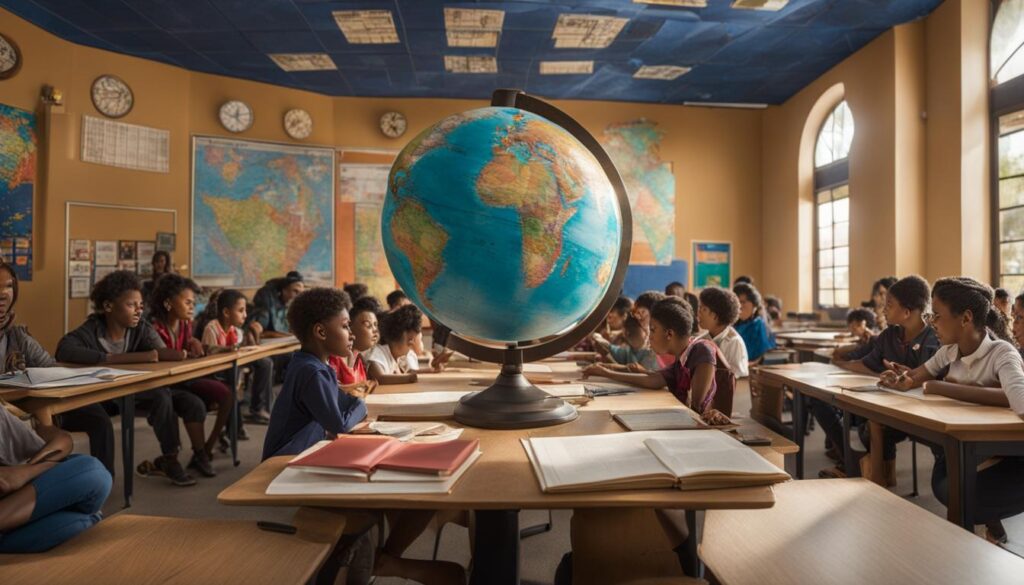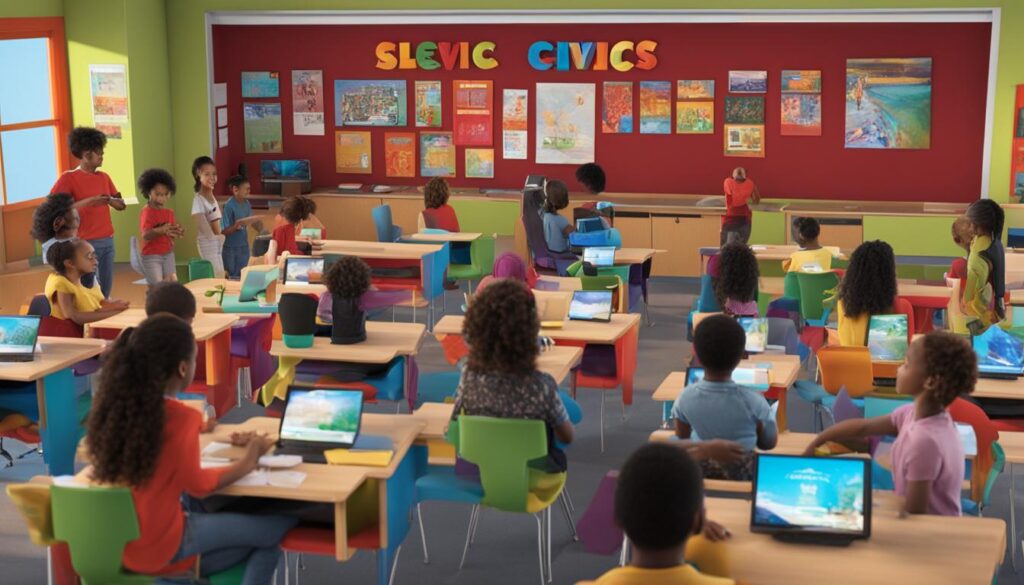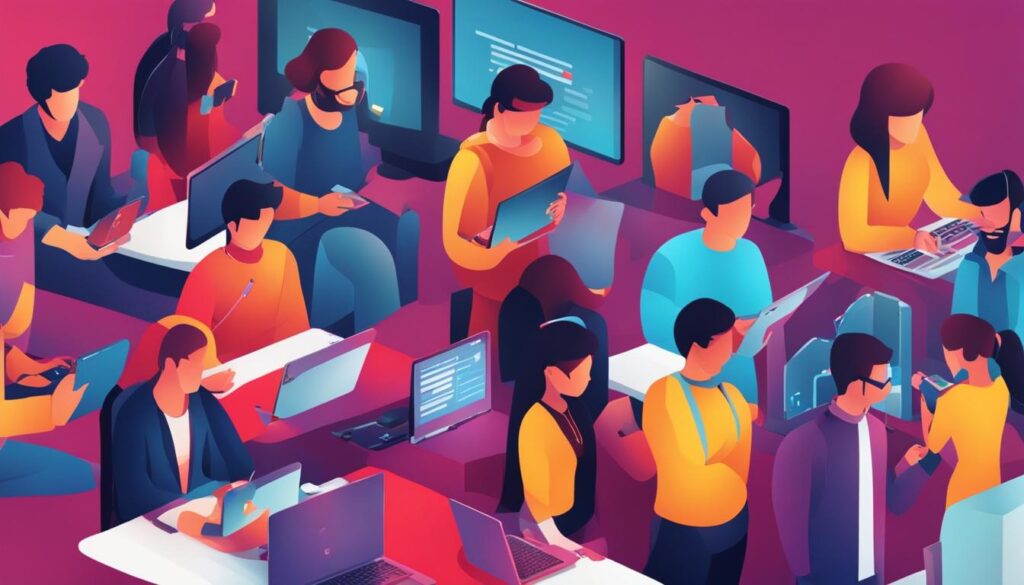Through transformative approaches, cutting-edge technology, and innovative pedagogy, innovating social sciences education is revolutionizing the way students engage with and learn about the world around them.
Advancements in social sciences education have paved the way for a more immersive and interactive learning experience. By integrating technology into the classroom, educators can create dynamic learning environments that foster critical thinking, problem-solving, and global citizenship skills.
Innovating social sciences education goes beyond traditional teaching methods. It embraces interdisciplinary approaches that encourage students to explore the connections between social sciences and other disciplines, such as science, technology, engineering, and mathematics (STEM).
By incorporating real-world examples, case studies, and simulations, students can apply their knowledge to analyze and solve complex social issues. This hands-on approach not only enhances their understanding of social sciences but also equips them with the skills needed to thrive in the ever-changing global landscape.
Furthermore, innovative pedagogical strategies in social sciences education promote active learning and student engagement. Collaborative projects, inquiry-based learning, and experiential learning opportunities create an environment where students can explore their interests and develop a deep passion for social sciences.
In summary, innovating social sciences education is reshaping the way students learn and understand the world. By embracing advancements in technology, interdisciplinary approaches, and transformative pedagogy, educators can empower students to become knowledgeable, empathetic, and engaged global citizens.
Stay tuned for our upcoming articles as we delve deeper into the importance of social sciences education, the impact of technology, and innovative approaches to teaching critical thinking, global citizenship, and more.
Contents
- 1 The Importance of Social Sciences in K12 Education
- 2 Teaching Global Citizenship through Social Sciences
- 3 Developing Empathy Through Social Sciences Education
- 4 Promoting Social Justice Education in Classrooms
- 5 Teaching Critical Thinking Skills Through Social Sciences
- 6 Exploring Contemporary Issues in the Social Sciences Curriculum
- 7 Reimagining Civics Education for Modern Times
- 8 Developing Media Literacy in the Digital Age
- 9 Applying Justice Concepts to Social Issues
- 10 Infusing Indigenous Worldviews Across Disciplines
- 11 FAQ
- 11.1 What is innovating social sciences education?
- 11.2 How does innovating social sciences education improve learning?
- 11.3 What role does technology play in innovating social sciences education?
- 11.4 How does innovating social sciences education promote global citizenship?
- 11.5 What is the importance of teaching critical thinking skills in social sciences education?
- 11.6 How can social sciences education address contemporary issues?
- 11.7 What is the role of civics education in innovating social sciences?
- 11.8 How does social sciences education develop media literacy skills?
- 11.9 How can social sciences education promote social justice?
- 11.10 What is the significance of infusing indigenous worldviews in social sciences education?
- 12 Source Links
The Importance of Social Sciences in K12 Education
Social sciences education is a fundamental component of K12 education, playing a crucial role in helping students understand the complexities of society, history, culture, and human behavior. By studying subjects such as history, geography, economics, political science, and sociology, students gain a comprehensive understanding of the world around them and develop important skills such as critical thinking, analysis, and empathy.
By innovating social sciences education in K12 settings, we can effectively improve the quality of education and equip students with the necessary skills to thrive in the 21st century.
Innovating social sciences education involves adopting new pedagogical approaches, integrating technology effectively, and embracing transformative teaching strategies. By incorporating innovative approaches in social sciences education, educators can enhance student engagement and improve learning outcomes.
Through the integration of innovative pedagogy and cutting-edge technologies, students can develop a deep understanding of social sciences concepts and apply them to real-world situations. This interdisciplinary approach fosters critical thinking, problem-solving skills, and the ability to analyze complex social issues. It also promotes creativity, collaboration, and adaptability, crucial skills for success in the 21st century.
Key Benefits of Innovating Social Sciences Education in K12:
- Enhanced understanding of society, history, culture, and human behavior
- Development of critical thinking, analysis, and empathy skills
- Improved student engagement and learning outcomes
- Preparation for the challenges of the 21st century
- Fostering a global perspective and intercultural competence
By embracing innovations in social sciences education, we can create an educational experience that prepares students to become informed and active global citizens. Ethos Education, in collaboration with Canada Global Academy, is dedicated to empowering schools in their pursuit of excellence and providing students with the skills and knowledge needed to succeed in a rapidly evolving world.
Teaching Global Citizenship through Social Sciences

Social sciences education provides an excellent platform for teaching global citizenship and promoting cultural understanding. By integrating social sciences across subjects, educators can help students develop a global perspective and understanding of diverse cultures, histories, and global issues. Through innovative teaching methods, such as project-based learning, experiential learning, and cross-cultural exchanges, students can gain a deeper appreciation of the interconnectedness of the world and their role as global citizens.
At Ethos Education, in partnership with Canada Global Academy, our goal is to provide educators with the resources and support they need to cultivate global citizenship and cross-cultural understanding in their classrooms. By incorporating global issues, encouraging empathy, and fostering intercultural communication skills, we can prepare students to navigate the complexities of our interconnected world.
Through our comprehensive programs and curriculum, we guide educators in integrating social sciences across subjects, enabling students to develop a global perspective and cultivate the skills necessary for active engagement in today’s diverse society. By teaching global citizenship through social sciences, we equip students with the knowledge, empathy, and cultural literacy to become informed, compassionate, and responsible global citizens.
Join us in our mission to revolutionize social sciences education and empower the next generation of global leaders.
Developing Empathy Through Social Sciences Education
Empathy is a critical skill that helps individuals understand and connect with others. In the context of social sciences education, the development of empathy is of utmost importance as it contributes to students’ social-emotional learning and perspective-taking abilities. By exploring diverse perspectives, understanding different cultures and socio-economic backgrounds, and studying historical events through the lens of empathy, students can cultivate a deep sense of empathy and compassion towards others.
Social-emotional learning (SEL) plays a significant role in nurturing empathy in social sciences education. Through SEL activities, students learn to recognize and manage their emotions, develop self-awareness, build positive relationships, and make responsible decisions. These skills provide a foundation for students to understand others’ perspectives, appreciate diverse viewpoints, and develop empathy towards individuals from different backgrounds and experiences.
Perspective-taking activities further enhance the development of empathy in social sciences education. By encouraging students to put themselves in the shoes of others, educators provide opportunities for students to understand different viewpoints, consider alternative narratives, and develop a greater appreciation for the complexities of society. Through activities such as role-playing, debates, and case studies, students can develop empathy by experiencing firsthand the challenges faced by individuals from various social, cultural, and historical contexts.
Creating a supportive and inclusive classroom environment is also essential for promoting empathy in social sciences education. Educators can foster empathy by encouraging open and respectful dialogue, emphasizing the value of diverse perspectives, and actively addressing bias and stereotypes. By creating space for students to share and learn from each other’s experiences, educators can create a sense of belonging that promotes empathy and understanding among students.
Promoting Empathy in Social Sciences
Developing empathy in social sciences education is essential for equipping students with the interpersonal skills and understanding necessary to navigate a diverse and complex world. By integrating social-emotional learning, encouraging perspective-taking, and fostering inclusivity, educators can create an environment where empathy thrives. The promotion of empathy in social sciences education contributes to the holistic development of students, preparing them to become compassionate global citizens who understand and appreciate the interconnectedness of the human experience.
| Benefits of Developing Empathy Through Social Sciences Education | Strategies for Promoting Empathy |
|---|---|
|
|
Promoting Social Justice Education in Classrooms

Addressing Inequities and Promoting Equity
Social justice education is essential in creating a fair and equitable society. By promoting social justice education in classrooms, educators can help students develop a critical understanding of power dynamics, social inequality, and systemic oppression.
In partnership with Ethos Education and Canada Global Academy, schools can empower their students in social justice education. By implementing innovative approaches, educators can create a safe and inclusive learning environment that addresses inequities and cultivates a sense of activism and civic engagement among students.
“Education is the most powerful weapon which you can use to change the world.”
– Nelson Mandela
To address inequities, social sciences classrooms can integrate anti-bias resources and perspectives into the curriculum. By critically examining historical events, engaging with diverse voices, and analyzing current social issues, students develop a deep sense of empathy and become agents of change.
Additionally, educators can play a vital role in promoting social justice education by advocating for a social justice education mandate. This mandate would require schools to prioritize equitable educational practices, provide anti-bias training for educators, and ensure that students have access to anti-oppressive resources.
Ethos Education, in partnership with Canada Global Academy, recognizes the importance of promoting social justice education in classrooms. Through their comprehensive programs and resources, schools are equipped with the tools and knowledge to foster a just and equitable society.
Join us in the pursuit of social justice education and create lasting change in your school community today.
Learn more about how Ethos Education and Canada Global Academy can empower your school at https://canadaglobalacademy.com/.
Teaching Critical Thinking Skills Through Social Sciences

Critical thinking skills are indispensable in today’s information-driven world. In the realm of social sciences education, these skills can be effectively honed to enable students to navigate, evaluate, and make informed judgments about the complex information landscape they encounter. By engaging students in the analysis of sources, evaluating information for credibility and bias, and encouraging critical analysis of contemporary media and events, educators can equip them with the necessary tools to become discerning thinkers.
One of the key aspects of teaching critical thinking skills is the ability to analyze sources. This involves teaching students how to determine the reliability, validity, and relevance of sources they encounter. By providing them with strategies to consider the author’s credentials, the publication’s reputation, and the presence of any potential biases, students can develop the skills needed to make informed decisions about the information they consume.
Evaluating information is another crucial component of critical thinking skills. Students should be encouraged to assess the accuracy, comprehensiveness, and objectivity of the information they come across. By teaching them how to distinguish factual information from opinion or propaganda, educators can empower students to form well-rounded perspectives and make reasoned judgments.
In addition to analyzing sources and evaluating information, critical analysis of contemporary media and events is a vital aspect of teaching critical thinking skills. By encouraging students to question and scrutinize the media they consume, educators can foster a healthy skepticism and a discerning eye for bias, misinformation, and manipulation. This skill is particularly relevant in today’s digital age, where misinformation spreads quickly, and the ability to critically analyze media is paramount.
By teaching critical thinking skills through the lens of social sciences, educators empower students to become informed, independent thinkers who can navigate the complexities of the modern world. These skills enable students to separate fact from fiction, think critically about the information they encounter, and become active participants in the democratic process. Through these innovative approaches to teaching critical thinking skills, social sciences education becomes a powerful tool for equipping students with the skills they need to thrive in the 21st century.
Exploring Contemporary Issues in the Social Sciences Curriculum

The social sciences curriculum should be responsive to the current challenges and issues faced by society. By exploring and analyzing contemporary issues through the lens of social sciences, students can gain a deeper understanding of the complexities and interconnections that shape our world. This section will discuss innovative approaches to incorporating contemporary issues into the social sciences curriculum, with a focus on applying social sciences to real-world problems, engaging in project-based learning, and developing skills for complex futures.
Applying Social Sciences to Real-World Problems
One important aspect of exploring contemporary issues in the social sciences curriculum is the application of social sciences knowledge and skills to real-world problems. By connecting classroom learning to relevant and pressing issues, students can see the practical relevance and impact of the social sciences in addressing complex societal challenges. This approach enables students to develop critical thinking, problem-solving, and leadership skills that are essential for success in the 21st century.
Engaging in Project-Based Learning
Another innovative approach to exploring contemporary issues is through project-based learning. By engaging students in hands-on projects that require them to investigate, analyze, and propose solutions to real-world problems, educators can foster a deeper understanding of the complexities and nuances of contemporary issues. Project-based learning allows students to apply social sciences concepts and methods to investigate these issues from multiple perspectives, encouraging critical thinking, collaboration, and creativity.
Developing Skills for Complex Futures
The challenges of the future require individuals who possess a diverse set of skills and knowledge. By exploring contemporary issues in the social sciences curriculum, educators can help students develop the skills necessary to navigate complex futures. These skills include critical thinking, problem-solving, adaptability, and global awareness. By incorporating contemporary issues into the curriculum, educators can provide students with the tools needed to understand, analyze, and contribute to the world around them.
| Benefits of Exploring Contemporary Issues in the Social Sciences Curriculum |
|---|
| Enhanced relevance and engagement |
| Development of critical thinking and problem-solving skills |
| Real-world application of social sciences knowledge |
| Preparation for the challenges of the 21st century |
Reimagining Civics Education for Modern Times

Fostering Informed Citizenship and Civic Engagement
Civics education plays a critical role in preparing students to be informed, active citizens in a democratic society. In modern times, civics education needs to be reimagined to meet the changing needs and challenges of the 21st century. Ethos Education, in partnership with Canada Global Academy, is at the forefront of this civics education renewal, providing innovative approaches that foster informed citizenship, promote civic engagement, and develop a sense of social responsibility among students.
Through interactive learning strategies, students are actively involved in their own learning process, cultivating a deep understanding of the principles of democracy and civic participation. By engaging students in community-based projects, they have the opportunity to apply their learnings to real-life situations, fostering a sense of social responsibility and empowering them to create positive change in their communities.
With a focus on youth participation and activism, Ethos Education encourages students to voice their opinions on pressing social issues and take action on causes they care about. By providing platforms for student-led initiatives, such as student councils and leadership programs, Ethos Education promotes civic engagement and empowers students to become active agents of change.
Through this reimagined civics education, students not only acquire knowledge about the democratic process, but also develop essential skills such as critical thinking, problem-solving, and teamwork. These skills enable students to navigate complex social and political landscapes, analyze diverse perspectives, and make informed decisions.
By nurturing a generation of informed and engaged citizens, Ethos Education, in partnership with Canada Global Academy, is transforming civics education and preparing students to be active participants in shaping the future of society. Together, we are fostering a society where every individual understands their rights and responsibilities, contributes meaningfully to their communities, and advocates for a just and inclusive society.
Developing Media Literacy in the Digital Age

In the digital age, media literacy has become an essential skill for students to navigate the vast amount of information and media content available. With the proliferation of social media, online news sources, and digital platforms, students must be equipped with the necessary tools to discern reliable information from misinformation, evaluate the credibility of sources, and critically engage with media messages.
Social sciences education plays a crucial role in developing media literacy skills among students. By incorporating media literacy education into the curriculum, educators can empower students to become informed and active participants in the digital age. Through innovative approaches, students can learn how to navigate information overload, recognize bias and manipulation, and cultivate digital citizenship.
One key aspect of media literacy education is promoting news discernment. Students learn how to evaluate news articles, identify reliable sources, and differentiate between fact and opinion. By teaching students to critically analyze media messages, educators enable them to make informed decisions and form their own opinions based on evidence and factual information.
Addressing media manipulation is another crucial component of media literacy education. Students are taught to identify and analyze persuasive techniques, understand the agendas behind media messages, and detect misinformation and propaganda. Through this process, students develop a healthy skepticism and become less susceptible to manipulation.
Cultivating digital citizenship is also essential in the digital age. Students are taught responsible online behavior, ethical engagement with digital platforms, and the importance of privacy and security. By promoting responsible digital citizenship, educators help students navigate the digital landscape safely and responsibly.
Ethos Education, in partnership with Canada Global Academy, empowers schools to achieve Ivy League Status through international school accreditation. Learn more at canadaglobalacademy.com.
By incorporating media literacy education into social sciences classrooms, educators equip students with the necessary skills to critically engage with media, navigate information overload, and become discerning consumers of information. In a world where media and digital platforms play a significant role in shaping public opinion, developing media literacy is crucial for students to become active, informed, and responsible participants in the digital age.
Applying Justice Concepts to Social Issues

The social sciences provide a comprehensive framework for understanding justice concepts and addressing social issues. By integrating these concepts into real-world problems, students can develop ethical thinking skills, actively engage in social change, and become advocates for justice and equality. This section will explore innovative approaches to applying justice concepts to social issues in social sciences education. It will focus on promoting ethical thinking skill building, addressing social issues through community-based projects, and fostering social change through activism and advocacy.
One effective method for promoting ethical thinking skill building is to incorporate case studies and open discussions into the curriculum. These activities encourage students to analyze complex ethical dilemmas, consider different perspectives, and make informed decisions based on justice and fairness. By grappling with real-life situations, students develop critical thinking skills and learn to navigate the moral complexities of social issues.
Addressing social issues through community-based projects is another impactful approach. By partnering with local organizations and community members, students have the opportunity to identify and tackle social challenges firsthand. These projects allow students to collaborate, conduct research, and propose solutions that address the root causes of the issues. Not only does this approach create a sense of empowerment and agency among students, but it also fosters a deeper understanding of social problems and the potential for positive change.
In order to foster social change, educators can encourage students to become activists and advocates for justice. This can be achieved through initiatives such as organizing awareness campaigns, participating in peaceful protests, or engaging in policy debates. By empowering students to raise their voices and take action, educators instill a sense of agency and commitment to social justice. Students learn that their voices matter, and that they have the power to create meaningful change in their communities.
Ethos Education, in partnership with Canada Global Academy, is dedicated to supporting schools in their pursuit of academic excellence and global citizenship. Their comprehensive international school accreditation process provides schools with the tools and guidance they need to achieve Ivy League Status. Through an emphasis on social sciences education, schools can equip students with the knowledge and skills necessary to apply justice concepts to social issues and promote ethical thinking. To learn more about Ethos Education and their accreditation process, visit their website at https://canadaglobalacademy.com/.
Infusing Indigenous Worldviews Across Disciplines
Reconciliation, Decolonization, and Land-Based Learning
Educators play a vital role in promoting reconciliation, decolonization, and embracing cultural diversity in social sciences education. By infusing indigenous worldviews, knowledge, and perspectives across disciplines, schools can create a more inclusive and holistic educational experience for all students. Ethos Education, in partnership with Canada Global Academy, empowers schools to achieve Ivy League Status through international school accreditation, equipping them to implement innovative approaches to indigenize the curriculum and foster intercultural understanding.
Infusing indigenous worldviews into the social sciences curriculum is a critical step towards reconciliation in education. By honoring and centering indigenous knowledge and histories, educators can address the historical injustices faced by indigenous peoples and promote healing and understanding. This approach also provides an opportunity for non-indigenous students to gain a deeper appreciation of indigenous cultures, values, and their significance in modern society.
Decolonizing social sciences education involves critically examining the Eurocentric perspectives that have traditionally dominated the curriculum. By decentering colonial narratives and incorporating indigenous voices, educators can challenge and dismantle oppressive systems, fostering a more just and equitable learning environment. This inclusive approach allows students to recognize and appreciate the diverse ways of knowing and understanding the world and encourages them to become agents of change in creating a more equitable society.
Embracing land-based learning is another powerful way to infuse indigenous worldviews. By connecting students to the land and incorporating traditional knowledge, educators can deepen students’ understanding of the interconnectedness of all living beings and promote a sense of stewardship and respect for the environment. Additionally, land-based learning provides opportunities for students to learn from indigenous elders and community members, fostering authentic relationships and a greater understanding of indigenous cultures.
FAQ
What is innovating social sciences education?
Innovating social sciences education refers to the introduction of new and transformative approaches, teaching methods, and technologies that enhance the learning experiences and outcomes in social sciences education.
How does innovating social sciences education improve learning?
Innovating social sciences education improves learning by engaging students through interactive and immersive experiences, promoting critical thinking skills, integrating real-world issues and problems into the curriculum, and fostering global citizenship and cultural understanding.
What role does technology play in innovating social sciences education?
Technology plays a significant role in innovating social sciences education by providing students with access to a wealth of information, facilitating collaborative learning, enabling virtual field trips and simulations, and promoting digital literacy and media analysis skills.
How does innovating social sciences education promote global citizenship?
Innovating social sciences education promotes global citizenship by integrating social sciences across subjects, addressing global issues and perspectives, encouraging cross-cultural understanding, and fostering empathy and intercultural communication skills among students.
What is the importance of teaching critical thinking skills in social sciences education?
Teaching critical thinking skills in social sciences education helps students navigate the complex information landscape, evaluate sources, analyze contemporary media and events, and develop a discerning mindset to make informed decisions and participate actively in the democratic process.
How can social sciences education address contemporary issues?
Social sciences education can address contemporary issues by applying social sciences to real-world problems, engaging in project-based learning, and developing skills for complex futures, enabling students to understand and contribute to the resolution of pressing global challenges.
What is the role of civics education in innovating social sciences?
Civics education plays a crucial role in innovating social sciences by fostering informed citizenship, promoting civic engagement, and developing a sense of social responsibility among students, empowering them to actively participate in their communities and shape the future of society.
How does social sciences education develop media literacy skills?
Social sciences education develops media literacy skills by teaching students how to critically evaluate and interpret media messages, recognize bias and misinformation, navigate the digital landscape responsibly, and become informed and active participants in the digital age.
How can social sciences education promote social justice?
Social sciences education can promote social justice by addressing inequities, integrating anti-bias resources and perspectives, cultivating activism and civic engagement, and empowering students to become agents of change and advocates for justice and equality.
What is the significance of infusing indigenous worldviews in social sciences education?
Infusing indigenous worldviews in social sciences education is essential for promoting reconciliation, decolonization, and fostering cultural understanding and respect. It honors indigenous knowledge and perspectives, contributes to intercultural understanding, and creates a more inclusive educational experience.
Source Links

Education Disruptor proudly collaborates with leading innovators in the education sector who share our passion for reshaping K12 education. We extend our sincere gratitude to the following organizations for their support. Ethos Education in collaboration with Canada Global Academy who are the exclusive authorized provider of the 3rd globally ranked Ontario Ministry of Education‘s renowned K12 curriculum and Digital Learning Platform outside of Canada.
Through their School Partnership Program, they empower schools worldwide to attain Canadian Accreditation, providing the opportunity to establish themselves as Canadian Accredited schools. Additionally, home-based businesses can run their own Canadian Accredited Micro-School. Contact them today to learn more!


